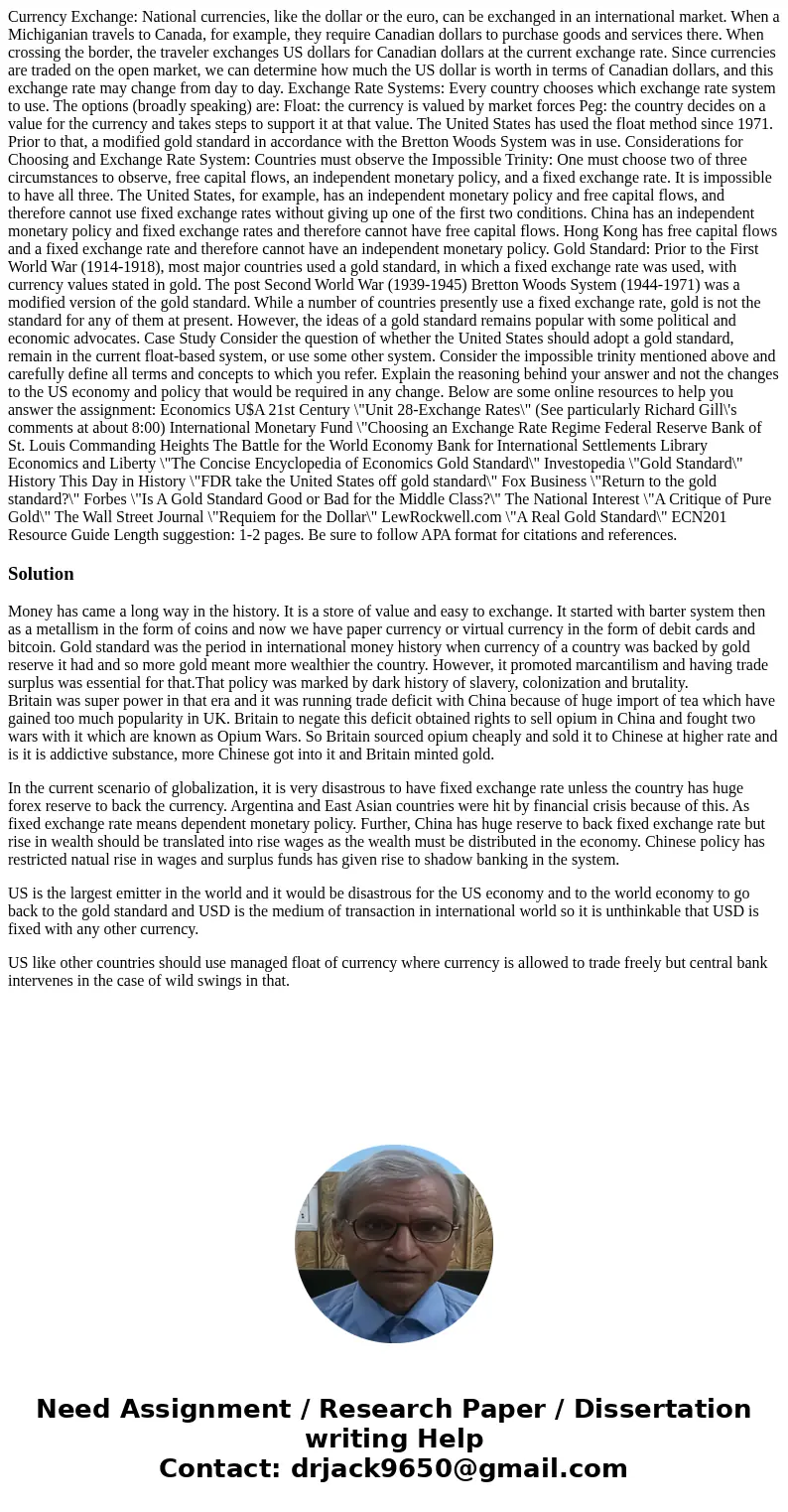Currency Exchange National currencies like the dollar or the
Currency Exchange: National currencies, like the dollar or the euro, can be exchanged in an international market. When a Michiganian travels to Canada, for example, they require Canadian dollars to purchase goods and services there. When crossing the border, the traveler exchanges US dollars for Canadian dollars at the current exchange rate. Since currencies are traded on the open market, we can determine how much the US dollar is worth in terms of Canadian dollars, and this exchange rate may change from day to day. Exchange Rate Systems: Every country chooses which exchange rate system to use. The options (broadly speaking) are: Float: the currency is valued by market forces Peg: the country decides on a value for the currency and takes steps to support it at that value. The United States has used the float method since 1971. Prior to that, a modified gold standard in accordance with the Bretton Woods System was in use. Considerations for Choosing and Exchange Rate System: Countries must observe the Impossible Trinity: One must choose two of three circumstances to observe, free capital flows, an independent monetary policy, and a fixed exchange rate. It is impossible to have all three. The United States, for example, has an independent monetary policy and free capital flows, and therefore cannot use fixed exchange rates without giving up one of the first two conditions. China has an independent monetary policy and fixed exchange rates and therefore cannot have free capital flows. Hong Kong has free capital flows and a fixed exchange rate and therefore cannot have an independent monetary policy. Gold Standard: Prior to the First World War (1914-1918), most major countries used a gold standard, in which a fixed exchange rate was used, with currency values stated in gold. The post Second World War (1939-1945) Bretton Woods System (1944-1971) was a modified version of the gold standard. While a number of countries presently use a fixed exchange rate, gold is not the standard for any of them at present. However, the ideas of a gold standard remains popular with some political and economic advocates. Case Study Consider the question of whether the United States should adopt a gold standard, remain in the current float-based system, or use some other system. Consider the impossible trinity mentioned above and carefully define all terms and concepts to which you refer. Explain the reasoning behind your answer and not the changes to the US economy and policy that would be required in any change. Below are some online resources to help you answer the assignment: Economics U$A 21st Century \"Unit 28-Exchange Rates\" (See particularly Richard Gill\'s comments at about 8:00) International Monetary Fund \"Choosing an Exchange Rate Regime Federal Reserve Bank of St. Louis Commanding Heights The Battle for the World Economy Bank for International Settlements Library Economics and Liberty \"The Concise Encyclopedia of Economics Gold Standard\" Investopedia \"Gold Standard\" History This Day in History \"FDR take the United States off gold standard\" Fox Business \"Return to the gold standard?\" Forbes \"Is A Gold Standard Good or Bad for the Middle Class?\" The National Interest \"A Critique of Pure Gold\" The Wall Street Journal \"Requiem for the Dollar\" LewRockwell.com \"A Real Gold Standard\" ECN201 Resource Guide Length suggestion: 1-2 pages. Be sure to follow APA format for citations and references.
Solution
Money has came a long way in the history. It is a store of value and easy to exchange. It started with barter system then as a metallism in the form of coins and now we have paper currency or virtual currency in the form of debit cards and bitcoin. Gold standard was the period in international money history when currency of a country was backed by gold reserve it had and so more gold meant more wealthier the country. However, it promoted marcantilism and having trade surplus was essential for that.That policy was marked by dark history of slavery, colonization and brutality.
Britain was super power in that era and it was running trade deficit with China because of huge import of tea which have gained too much popularity in UK. Britain to negate this deficit obtained rights to sell opium in China and fought two wars with it which are known as Opium Wars. So Britain sourced opium cheaply and sold it to Chinese at higher rate and is it is addictive substance, more Chinese got into it and Britain minted gold.
In the current scenario of globalization, it is very disastrous to have fixed exchange rate unless the country has huge forex reserve to back the currency. Argentina and East Asian countries were hit by financial crisis because of this. As fixed exchange rate means dependent monetary policy. Further, China has huge reserve to back fixed exchange rate but rise in wealth should be translated into rise wages as the wealth must be distributed in the economy. Chinese policy has restricted natual rise in wages and surplus funds has given rise to shadow banking in the system.
US is the largest emitter in the world and it would be disastrous for the US economy and to the world economy to go back to the gold standard and USD is the medium of transaction in international world so it is unthinkable that USD is fixed with any other currency.
US like other countries should use managed float of currency where currency is allowed to trade freely but central bank intervenes in the case of wild swings in that.

 Homework Sourse
Homework Sourse